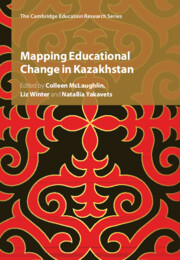Book contents
- Mapping Educational Change in Kazakhstan
- Mapping Educational Change in Kazakhstan
- Copyright page
- Dedication
- Contents
- Figures
- Tables
- Contributors
- Preface
- Acknowledgements
- Introduction
- Part I Foundations of Scaling Up
- Part II Piloting Initiatives and Scaling Up to the Whole System
- 6 Piloting the Renewed Content of Education
- 7 Revising the Content and Standards of Student Assessment
- 8 New Ways of Financing Schools
- 9 Professional Capacity of the Leading Schools as a Managing Mechanism in Updating the Content of Secondary Education in Kazakhstan
- 10 The Teacher Leadership in Kazakhstan Initiative
- 11 Developing Teachers as Researchers
- Part III Evidence of Implementation
- Conclusions
- Select Bibliography: School-Level Educational Reforms in Kazakhstan, 2011–2022
- Index
- References
9 - Professional Capacity of the Leading Schools as a Managing Mechanism in Updating the Content of Secondary Education in Kazakhstan
from Part II - Piloting Initiatives and Scaling Up to the Whole System
Published online by Cambridge University Press: 09 November 2023
- Mapping Educational Change in Kazakhstan
- Mapping Educational Change in Kazakhstan
- Copyright page
- Dedication
- Contents
- Figures
- Tables
- Contributors
- Preface
- Acknowledgements
- Introduction
- Part I Foundations of Scaling Up
- Part II Piloting Initiatives and Scaling Up to the Whole System
- 6 Piloting the Renewed Content of Education
- 7 Revising the Content and Standards of Student Assessment
- 8 New Ways of Financing Schools
- 9 Professional Capacity of the Leading Schools as a Managing Mechanism in Updating the Content of Secondary Education in Kazakhstan
- 10 The Teacher Leadership in Kazakhstan Initiative
- 11 Developing Teachers as Researchers
- Part III Evidence of Implementation
- Conclusions
- Select Bibliography: School-Level Educational Reforms in Kazakhstan, 2011–2022
- Index
- References
Summary
This chapter presents the results of monitoring research conducted by the Center of Excellence in 2018–2021. The focus of the research was the professional potential of leading schools established in each region of Kazakhstan as a mechanism for testing innovative ideas and further large-scale translation, taking into account the accumulated experience and the optimal strategy of action. The theoretical and practical basis of the research consists of analytical materials and empirical research data, confirming the dominant role of professional capital. On this contextual basis, the methodology and criteria-evaluation framework were defined, research and interpretation of the data obtained were carried out and conclusions were formulated. The database was formed on the basis of self-evaluation of professional potential by managers and teachers of all leading schools and the evaluative opinion of partner schools, which were methodologically supported. The multiplicity of studies, the representative sample and the triangulation method used have provided sufficient qualitative and quantitative data for the formulation of objective findings and timely decision-making.
- Type
- Chapter
- Information
- Mapping Educational Change in Kazakhstan , pp. 151 - 172Publisher: Cambridge University PressPrint publication year: 2023



